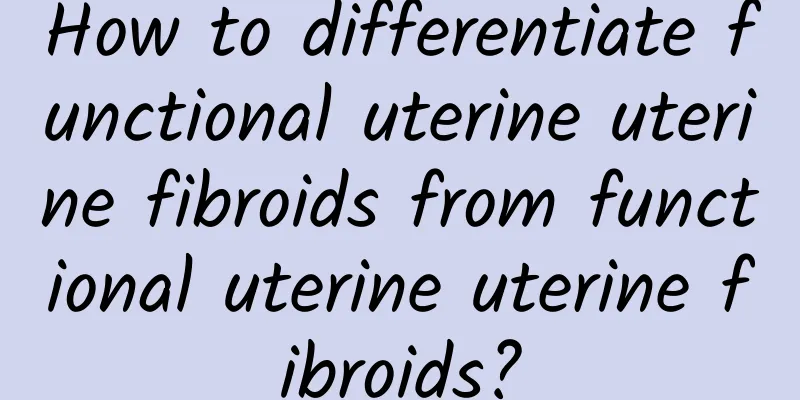How to differentiate functional uterine uterine fibroids from functional uterine uterine fibroids?

|
Xiao Ping had been planning to have a child, and her plan was going well, but she was not lucky enough to have irregular menstruation. Every time her menstruation was always continuous, and even if she finally stopped, it would come again within half a month, and the amount of blood was quite heavy. More than a year had passed, and the problem did not get better. Not to mention having a child, Xiao Ping's body gradually became weak, and she also developed anemia. Xiao Ping was scared when she heard from her colleagues that Wang Jie from the HR department had a uterine fibroid when she was suffering from her condition, so she went to the hospital immediately, but it turned out to be functional uterine bleeding. For this reason, Xiao Ping thought that functional uterine bleeding and uterine fibroids can both cause bleeding, so are they really similar? Dysfunctional uterine bleeding and uterine fibroids have similarities and are very easy to confuse. First, in the menopausal transition period, there is no ovulation and no corpus luteum formation. The endometrium is stimulated by estrogen for a long time and lacks the influence of progesterone, so the endometrium proliferates or proliferates too long; and the endometrium of patients with uterine fibroids may also have hyperplasia. Therefore, functional uterine bleeding and uterine fibroids may have similar clinical symptoms, especially those with functional uterine bleeding in the menopausal transition period are mostly multiparous or multiparous women. In addition to the increase in diameter and inner cavity of the uterus, the weight can increase by 1 time. This is one of the reasons for clinical misdiagnosis; secondly, B-ultrasound is still difficult to diagnose small uterine fibroids in the early stage. Sometimes endometrial hyperplasia is very similar to submucosal uterine fibroids, which is difficult to distinguish with B-ultrasound. Therefore, in clinical diagnosis, comprehensive curettage is not only suitable for functional uterine bleeding, but also for uterine fibroids, because uterine fibroids combined with excessive endometrial hyperplasia can be improved by curettage, and comprehensive curettage can not only diagnose hyperplasia, but also cure it. At the same time, dynamic observation of the shape and size of abnormal echoes in the uterine cavity by B-ultrasound is of great significance for the differentiation of the two. |
<<: How to provide nutritional guidance to prevent functional uterine bleeding in adolescence?
>>: Personal hygiene guidance can prevent functional uterine bleeding in adolescents
Recommend
How to treat uterine fibroids? How to treat uterine fibroids?
Modern medical research has found that the estrog...
New Year’s Eve meals lack dietary fiber, which will send your stomach and intestines into alarm! Nutritionist: Supplement 3 kinds of health foods to help regulate nutrition
If you eat too much meat and fish during the Chin...
What to do if ovarian cysts recur
What should I do if ovarian cysts recur? Ovarian ...
Postpartum weight loss: 6 diet tips from Mark's mom
The blogger "Mark Mama", who has four c...
Eating a lot of oil and salt can cause constipation. Drink 3 teas to improve your intestines.
For many busy office workers, three meals a day a...
Office workers should be careful when eating snacks! These 5 types of snacks are super high in calories and should never be touched
When office workers feel hungry in the afternoon,...
What does cervical erosion mean?
Cervical erosion, currently often referred to as ...
What are the early symptoms of cervical erosion?
Cervical erosion is a common gynecological diseas...
Does pelvic inflammatory disease affect pregnancy?
Pelvic inflammatory disease refers to a group of ...
What is the reason for irregular menstruation after childbirth? 5 symptoms of irregular menstruation after childbirth
Many women will encounter such a situation, they ...
What does a weak positive ovulation test paper mean before menstruation?
Normal women of childbearing age have menstruatio...
Why do I feel a dull pain in my lower abdomen on the third day after medical abortion?
Dull pain in the lower abdomen refers to dull pai...
5 minutes a day to easily get a six-pack (Part 1)
How strange! Many people have slender and well-pr...
Tips: Treatment of secondary dysmenorrhea
Many female friends may be familiar with secondar...
What is threatened abortion bleeding?
If a pregnant woman experiences threatened miscar...









